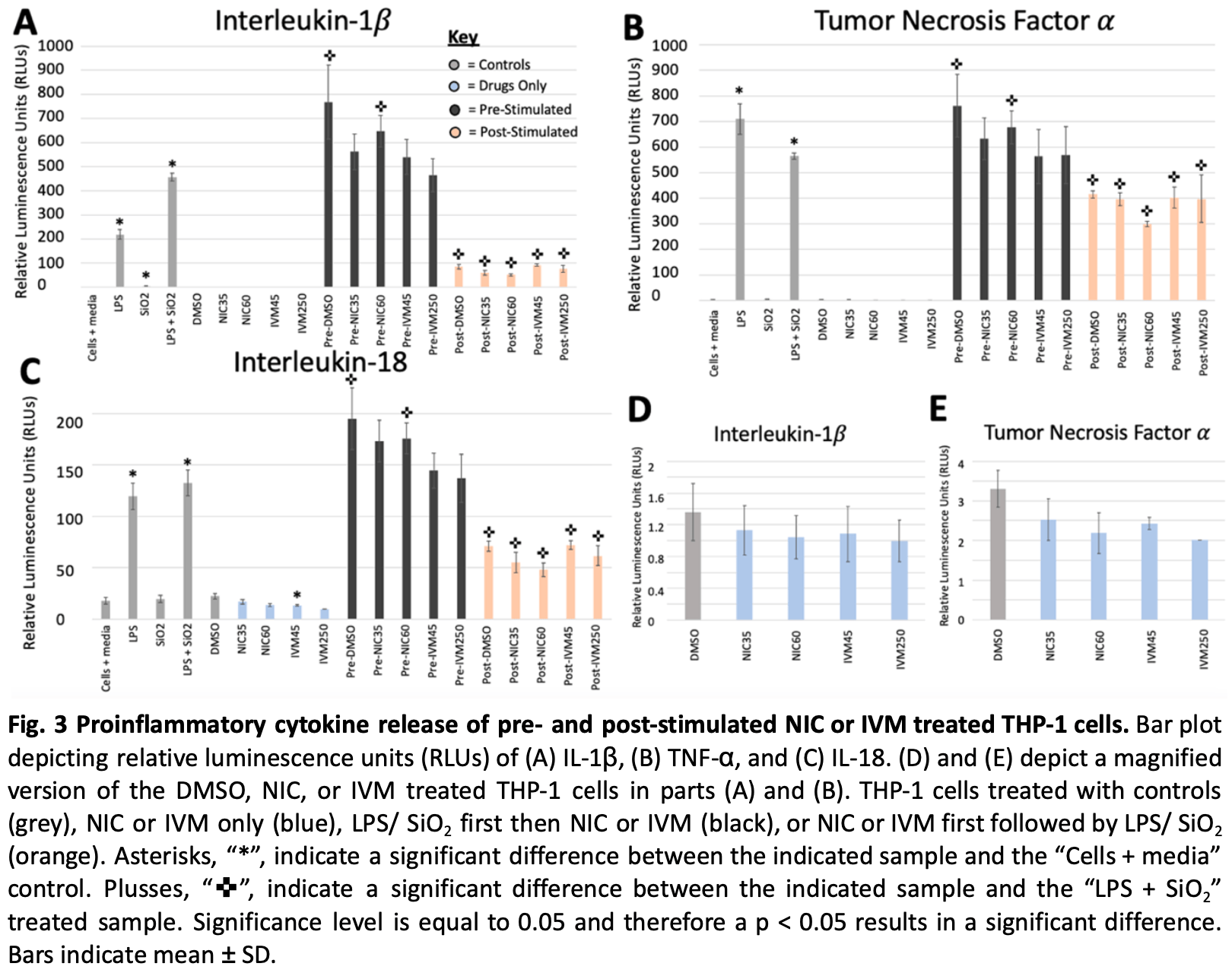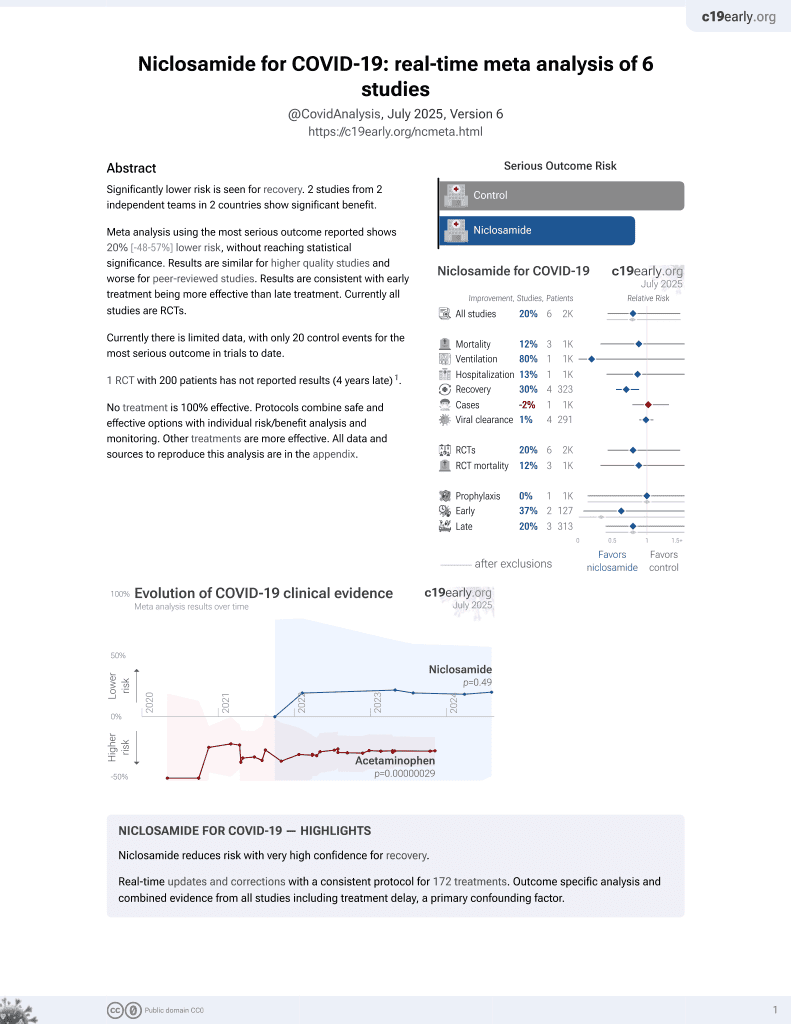
Niclosamide and ivermectin modulate caspase-1 activity and proinflammatory cytokine secretion in a monocytic cell line
et al., British Society For Nanomedicine Early Career Researcher Summer Meeting, 2021, Jun 2021
56th treatment shown to reduce risk in
August 2025, now with p = 0.0069 from 7 studies.
Lower risk for recovery.
No treatment is 100% effective. Protocols
combine treatments.
6,400+ studies for
210+ treatments. c19early.org
|
In vitro study showing potential therapeutic effects of ivermectin and niclosamide on the immune system by reducing inflammation and modulating key proteins involved in the inflammatory response. Ivermectin and niclosamide reduced proinflammatory markers and NLRP3 formation, and reduced caspase-1 activity.
9 preclinical studies support the efficacy of niclosamide for COVID-19:
In silico studies predict inhibition of SARS-CoV-2 with niclosamide or metabolites via binding to the spikeA,1, MproB,1, RNA-dependent RNA polymeraseC,1, PLproD,1, nucleocapsidE,1, and helicaseF,1 proteins.
Niclosamide inhibits endolysosomal acidification and suppresses
TLR3-mediated pro-inflammatory signaling in human small airway
epithelial cells stimulated with TLR3 agonists mimicking viral RNA2, modulates host lipid metabolism and reduces
infectious SARS-CoV-2 virion production in Vero E6 cells4, reduces CD147 protein levels and inhibits
SARS-CoV-2-induced upregulation of CD147 in A549-ACE2 cells, including
the highly glycosylated form of CD147 which has been implicated in
COVID-19 disease progression and post-COVID-19 cardiac complications5, blocked the formation of syncytia mediated by
SARS-CoV-2 spike protein pseudovirus-producing cells6, may reduce inflammation, NLRP3 formation, and
caspase-1 activity9, may inhibit viral uncoating, replication, and
assembly via disruption of pH gradients and reduced ATP production in
host cells8, may counter immune evasion by reversing E-, ORF7a-, and ORF8-mediated down-regulation of MHC-I, preserving CD8⁺ T-cell recognition10, and shows strong synergy when combined with
ivermectin7.
Study covers ivermectin and niclosamide.
1.
Haque et al., Exploring potential therapeutic candidates against COVID-19: a molecular docking study, Discover Molecules, doi:10.1007/s44345-024-00005-5.
2.
Pejler et al., Blockade of endolysosomal acidification suppresses TLR3-mediated pro-inflammatory signaling in airway epithelial cells, Journal of Allergy and Clinical Immunology, doi:10.1016/j.jaci.2024.05.031.
3.
Walia et al., SARS-CoV-2 virulence factor ORF3a blocks lysosome function by modulating TBC1D5-dependent Rab7 GTPase cycle, Nature Communications, doi:10.1038/s41467-024-46417-2.
4.
Garrett et al., Niclosamide as a chemical probe for analyzing SARS-CoV-2 modulation of host cell lipid metabolism, Frontiers in Microbiology, doi:10.3389/fmicb.2023.1251065.
5.
Yang et al., Repurposing Niclosamide as a Novel Anti-SARS-CoV-2 Drug by Restricting Entry Protein CD147, Biomedicines, doi:10.3390/biomedicines11072019.
6.
Sheng et al., A pseudovirus-based method to dynamically mimic SARS-CoV-2-associated cell-to-cell fusion and transmission, Acta Biochimica et Biophysica Sinica, doi:10.3724/abbs.2023129.
7.
Jitobaom et al., Synergistic anti-SARS-CoV-2 activity of repurposed anti-parasitic drug combinations, BMC Pharmacology and Toxicology, doi:10.1186/s40360-022-00580-8.
8.
Needham, D., The pH Dependence of Niclosamide Solubility, Dissolution, and Morphology: Motivation for Potentially Universal Mucin-Penetrating Nasal and Throat Sprays for COVID19, its Variants and other Viral Infections, Pharmaceutical Research, doi:10.1007/s11095-021-03112-x.
a.
The trimeric spike (S) protein is a glycoprotein that mediates viral entry by binding to the host ACE2 receptor, is critical for SARS-CoV-2's ability to infect host cells, and is a target of neutralizing antibodies. Inhibition of the spike protein prevents viral attachment, halting infection at the earliest stage.
b.
The main protease or Mpro, also known as 3CLpro or nsp5, is a cysteine protease that cleaves viral polyproteins into functional units needed for replication. Inhibiting Mpro disrupts the SARS-CoV-2 lifecycle within the host cell, preventing the creation of new copies.
c.
RNA-dependent RNA polymerase (RdRp), also called nsp12, is the core enzyme of the viral replicase-transcriptase complex that copies the positive-sense viral RNA genome into negative-sense templates for progeny RNA synthesis. Inhibiting RdRp blocks viral genome replication and transcription.
d.
The papain-like protease (PLpro) has multiple functions including cleaving viral polyproteins and suppressing the host immune response by deubiquitination and deISGylation of host proteins. Inhibiting PLpro may block viral replication and help restore normal immune responses.
e.
The nucleocapsid (N) protein binds and encapsulates the viral genome by coating the viral RNA. N enables formation and release of infectious virions and plays additional roles in viral replication and pathogenesis. N is also an immunodominant antigen used in diagnostic assays.
f.
The helicase, or nsp13, protein unwinds the double-stranded viral RNA, a crucial step in replication and transcription. Inhibition may prevent viral genome replication and the creation of new virus components.
Munson et al., 16 Jun 2021, preprint, 5 authors.
In vitro studies are an important part of preclinical research, however results may be very different in vivo.
Niclosamide and ivermectin modulate caspase-1 activity and proinflammatory cytokine secretion in a monocytic cell line
The COVID-19 pandemic has led to an unprecedented demand for new and repurposed therapeutics to ameliorate the morbidity and mortality associated with SARS-CoV-2 infection. However, there is still a paucity of information relating to successful antiviral compounds. The repurposing of immune modulators, such as dexamethasone and tocilizumab, has shown significant improvement in survival rates. Repurposing of small molecules that may have antiviral and immunomodulatory potential may have significant impact on the pandemic. Niclosamide and ivermectin are being investigated for repurposing as potential treatments for COVID-19 patients. Both niclosamide and ivermectin have been proposed and studied based upon possible immunomodulatory and antiviral activity. To improve their posology, there are also ongoing efforts to nano-formulate these drugs, but a much greater understanding of their mechanisms of action is required to rationalise their plausibility as candidates. We have previously shown that niclosamide can affect responses to immune stimulation in ex vivo cells from healthy rats exposed via a long-acting injectable formulation. The current study aimed to further understand the effects of niclosamide and ivermectin on inflammasome activity in human cells due to the involvement of inflammasomes in the hyperinflammation and coagulation observed in severely ill COVID-19 patients. Caspase-1 activity and proinflammatory cytokine secretion in THP1 cells exposed to physiologically-relevant concentrations of niclosamide and ivermectin were measured as markers of inflammasome activity. Exposure to both niclosamide and ivermectin led to lower caspase-1 activity compared to untreated cells as well as resulting in lower secretion of IL-1β, IL-18, and TNF-α if treated prior to LPS induction. These data in their own right should not be interpreted as being a conclusive indicator of the utility of these drugs in COVID-19. However, the data presented suggests a putative mechanism for the proposed immune modulation. Substantive further work is still needed to determine the precise mechanism(s) that underpin these findings and whether the observations are relevant in vivo.
References
Arshad, Prioritization of Anti-SARS-Cov-2 Drug Repurposing Opportunities Based on Plasma and Target Site Concentrations Derived from their Established Human Pharmacokinetics, Clinical Pharmacology & Therapeutics
Baker, A call for the appropriate application of clinical pharmacological principles in the search for safe and efficacious COVID-19 (SARS-COV-2) treatments, British Journal of Clinical Pharmacology
Cavalcanti, Hydroxychloroquine with or without Azithromycin in Mild-to-Moderate Covid-19, New England Journal of Medicine, doi:10.1056/NEJMoa2019014
Chen, Clinical and immunological features of severe and moderate coronavirus disease 2019, J Clin Invest
Hobson, Scalable nanoprecipitation of niclosamide and in vivo demonstration of long-acting delivery after intramuscular injection, Nanoscale
Junqueira, SARS-CoV-2 infects blood monocytes to activate NLRP3 and AIM2 inflammasomes, pyroptosis and cytokine release, doi:10.1101/2021.03.06.21252796
Liang, Inhibitory effects of niclosamide on inflammation and migration of fibroblast-like synoviocytes from patients with rheumatoid arthritis, Inflamm Res
Merad, Martin, Pathological inflammation in patients with COVID-19: a key role for monocytes and macrophages, Nature Reviews Immunology
Muñoz, Safety and pharmacokinetic profile of fixed-dose ivermectin with an innovative 18mg tablet in healthy adult volunteers, Nature Reviews Immunology
Pinho, EMA recommends COVID-19 Vaccine AstraZeneca for authorisation in the EU
Pneumonia, None, New England Journal of Medicine
Prabhakara, Niclosamide inhibits SARS-CoV2 entry by blocking internalization through pH-dependent CLIC/GEEC endocytic pathway, bioRxiv, doi:10.1101/2020.12.16.422529
Qin, Dysregulation of Immune Response in Patients With Coronavirus 2019 (COVID-19) in Wuhan, China, Clin Infect Dis
Rannard, Chasing COVID-19 chemotherapeutics without putting the cart before the horse, British Journal of Clinical Pharmacology n/a
Salama, Tocilizumab in Patients Hospitalized with Covid-19
Schweizer, A phase I study of niclosamide in combination with enzalutamide in men with castration-resistant prostate cancer, PLoS One
Skipper, Hydroxychloroquine in Nonhospitalized Adults With Early COVID-19 : A Randomized Trial, Ann Intern Med
Thi Tran, Kitami, Niclosamide activates the NLRP3 inflammasome by intracellular acidification and mitochondrial inhibition, Communications Biology
Wu, Inhibition of severe acute respiratory syndrome coronavirus replication by niclosamide, Antimicrob Agents Chemother
Yang, Recent advances in the mechanisms of NLRP3 inflammasome activation and its inhibitors, Cell Death & Disease
Yao, Vitro Antiviral Activity and Projection of Optimized Dosing Design of Hydroxychloroquine for the Treatment of Severe Acute Respiratory Syndrome Coronavirus 2 (SARS-CoV-2), Clin Infect Dis
Zhang, Ivermectin inhibits LPS-induced production of inflammatory cytokines and improves LPS-induced survival in mice, Inflamm. res
munson
